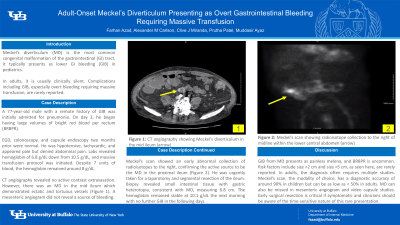Monday Poster Session
Category: GI Bleeding
P2097 - Adult Onset Meckel’s Diverticulum Presenting as Overt Gastrointestinal Bleeding Requiring Massive Transfusion
Monday, October 23, 2023
10:30 AM - 4:15 PM PT
Location: Exhibit Hall

Has Audio

Farhan Azad, DO
University at Buffalo
Buffalo, New York
Presenting Author(s)
Award: Presidential Poster Award
Farhan Azad, DO, Alexander M. Carlson, DO, Clive J. Miranda, DO, MS, Prutha Patel, DO, Muddasir Ayaz, MD
University at Buffalo, Buffalo, NY
Introduction: Meckel’s diverticulum (MD) is the most common congenital malformation of the gastrointestinal (GI) tract. It typically presents as lower GI bleeding (GIB) in pediatrics. In adults, it is usually clinically silent. Complications including GIB, especially overt bleeding requiring massive transfusion, are rarely reported in adults.
Case Description/Methods: A 77-year-old male with a remote history of GIB was initially admitted for pneumonia improving on antibiotics. On day 3 of hospitalization, the patient began having large volumes of bright red blood per rectum (BRBPR), with associated dizziness. EGD, colonoscopy, and capsule endoscopy two months prior showed no abnormalities. Vital signs revealed blood pressure of 52/66 mmHg and heart rate of 150 bpm. He appeared pale and in distress, although denied any abdominal pain. Laboratory values revealed hemoglobin of 6.8 g/dL, down from 10.5 g/dL on admission. Massive transfusion protocol was initiated and despite 7 units of packed RBCs, the hemoglobin showed a modest increase to around 7-8 g/dL. CT angiography revealed a large volume of blood and no active contrast extravasation. However, there was an MD in the mid ileum which demonstrated ectatic and tortuous vessels (Figure 1). Mesenteric angiogram did not reveal a source of bleeding. He immediately underwent a Meckel’s scan showing an early abnormal collection of radioisotopes to the right of the midline, within the lower central abdomen, confirming the active source to be the MD in the proximal ileum (Figure 2). He was urgently taken for a laparotomy and segmental resection of the ileum. Biopsy revealed small intestinal tissue with gastric heterotopia, consistent with MD, measuring 6.8 cm. The hemoglobin remained stable at 10.1 g/dL the next morning with no further GIB in the following days.
Discussion: In adults, GIB from MD presents as painless melena, and BRBPR is uncommon. Risk factors include size >2 cm and size >5 cm, as seen here, are rarely reported. In adults, the diagnosis often requires multiple studies. Meckel’s scan, considered the modality of choice, has a diagnostic accuracy of around 90% in children but can be as low as < 50% in adults. MD can also be missed in mesenteric angiogram and video capsule studies, as seen here. Early diagnosis and surgical resection, as done here, is critical in symptomatic MD and clinicians should be aware of the time-sensitive nature of this rare presentation in adults.

Disclosures:
Farhan Azad, DO, Alexander M. Carlson, DO, Clive J. Miranda, DO, MS, Prutha Patel, DO, Muddasir Ayaz, MD. P2097 - Adult Onset Meckel’s Diverticulum Presenting as Overt Gastrointestinal Bleeding Requiring Massive Transfusion, ACG 2023 Annual Scientific Meeting Abstracts. Vancouver, BC, Canada: American College of Gastroenterology.
Farhan Azad, DO, Alexander M. Carlson, DO, Clive J. Miranda, DO, MS, Prutha Patel, DO, Muddasir Ayaz, MD
University at Buffalo, Buffalo, NY
Introduction: Meckel’s diverticulum (MD) is the most common congenital malformation of the gastrointestinal (GI) tract. It typically presents as lower GI bleeding (GIB) in pediatrics. In adults, it is usually clinically silent. Complications including GIB, especially overt bleeding requiring massive transfusion, are rarely reported in adults.
Case Description/Methods: A 77-year-old male with a remote history of GIB was initially admitted for pneumonia improving on antibiotics. On day 3 of hospitalization, the patient began having large volumes of bright red blood per rectum (BRBPR), with associated dizziness. EGD, colonoscopy, and capsule endoscopy two months prior showed no abnormalities. Vital signs revealed blood pressure of 52/66 mmHg and heart rate of 150 bpm. He appeared pale and in distress, although denied any abdominal pain. Laboratory values revealed hemoglobin of 6.8 g/dL, down from 10.5 g/dL on admission. Massive transfusion protocol was initiated and despite 7 units of packed RBCs, the hemoglobin showed a modest increase to around 7-8 g/dL. CT angiography revealed a large volume of blood and no active contrast extravasation. However, there was an MD in the mid ileum which demonstrated ectatic and tortuous vessels (Figure 1). Mesenteric angiogram did not reveal a source of bleeding. He immediately underwent a Meckel’s scan showing an early abnormal collection of radioisotopes to the right of the midline, within the lower central abdomen, confirming the active source to be the MD in the proximal ileum (Figure 2). He was urgently taken for a laparotomy and segmental resection of the ileum. Biopsy revealed small intestinal tissue with gastric heterotopia, consistent with MD, measuring 6.8 cm. The hemoglobin remained stable at 10.1 g/dL the next morning with no further GIB in the following days.
Discussion: In adults, GIB from MD presents as painless melena, and BRBPR is uncommon. Risk factors include size >2 cm and size >5 cm, as seen here, are rarely reported. In adults, the diagnosis often requires multiple studies. Meckel’s scan, considered the modality of choice, has a diagnostic accuracy of around 90% in children but can be as low as < 50% in adults. MD can also be missed in mesenteric angiogram and video capsule studies, as seen here. Early diagnosis and surgical resection, as done here, is critical in symptomatic MD and clinicians should be aware of the time-sensitive nature of this rare presentation in adults.

Figure: Figure 1: CT angiography showing Meckel's diverticulum in the mid ileum (arrow)
Figure 2: Meckel’s scan showing radioisotope collection to the right of midline within the lower central abdomen (arrow)
Figure 2: Meckel’s scan showing radioisotope collection to the right of midline within the lower central abdomen (arrow)
Disclosures:
Farhan Azad indicated no relevant financial relationships.
Alexander Carlson indicated no relevant financial relationships.
Clive Miranda indicated no relevant financial relationships.
Prutha Patel indicated no relevant financial relationships.
Muddasir Ayaz indicated no relevant financial relationships.
Farhan Azad, DO, Alexander M. Carlson, DO, Clive J. Miranda, DO, MS, Prutha Patel, DO, Muddasir Ayaz, MD. P2097 - Adult Onset Meckel’s Diverticulum Presenting as Overt Gastrointestinal Bleeding Requiring Massive Transfusion, ACG 2023 Annual Scientific Meeting Abstracts. Vancouver, BC, Canada: American College of Gastroenterology.

